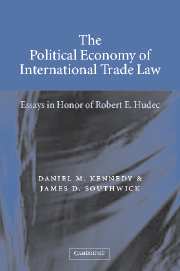Book contents
- Frontmatter
- Contents
- List of contributors
- Preface
- Foreword by E. THOMAS SULLIVAN
- Introduction: An overview of the volume
- Part I The constitutional developments of international trade law
- Part II The scope of international trade law: Adding new subjects and restructuring old ones
- Part III Legal relations between developed and developing countries
- Part IV The operation of the WTO dispute settlement procedure
- 15 Testing international trade law: Empirical studies of GATT/WTO dispute settlement
- 16 The Appellate Body and its contribution to WTO dispute settlement
- 17 A permanent panel body for WTO dispute settlement: Desirable or practical?
- Comment: Step by step to an international trade court
- 18 International trade policy and domestic food safety regulation: The case for substantial deference by the WTO Dispute Settlement Body under the SPS Agreement
- Comment: The case against clarity
- 19 Judicial supremacy, judicial restraint, and the issue of consistency of preferential trade agreements with the WTO: The apple in the picture
- 20 Should the teeth be pulled? An analysis of WTO sanctions
- 21 Problems with the compliance structure of the WTO dispute resolution process
- 22 “Inducing compliance” in WTO dispute settlement
- Bibliography of works by ROBERT E. HUDEC
- Index
22 - “Inducing compliance” in WTO dispute settlement
Published online by Cambridge University Press: 02 September 2009
- Frontmatter
- Contents
- List of contributors
- Preface
- Foreword by E. THOMAS SULLIVAN
- Introduction: An overview of the volume
- Part I The constitutional developments of international trade law
- Part II The scope of international trade law: Adding new subjects and restructuring old ones
- Part III Legal relations between developed and developing countries
- Part IV The operation of the WTO dispute settlement procedure
- 15 Testing international trade law: Empirical studies of GATT/WTO dispute settlement
- 16 The Appellate Body and its contribution to WTO dispute settlement
- 17 A permanent panel body for WTO dispute settlement: Desirable or practical?
- Comment: Step by step to an international trade court
- 18 International trade policy and domestic food safety regulation: The case for substantial deference by the WTO Dispute Settlement Body under the SPS Agreement
- Comment: The case against clarity
- 19 Judicial supremacy, judicial restraint, and the issue of consistency of preferential trade agreements with the WTO: The apple in the picture
- 20 Should the teeth be pulled? An analysis of WTO sanctions
- 21 Problems with the compliance structure of the WTO dispute resolution process
- 22 “Inducing compliance” in WTO dispute settlement
- Bibliography of works by ROBERT E. HUDEC
- Index
Summary
Ultimately, I would favor a system in which sanctions would come for violating any provision of a trade agreement.
President William J. ClintonSanctioning authority is rarely granted by treaty, rarely used when granted, and likely to be ineffective when used.
Abram Chayes and Antonia Handler ChayesWhen a Member of the World Trade Organization (WTO) fails to conform its practices to the rulings and recommendations contained in an adopted dispute settlement report, the prevailing party may be authorized by the WTO's Dispute Settlement Body (DSB) to take action against the WTO interests of the offending Member. Pursuant to the WTO's Understanding on Rules and Procedures Governing the Settlement of Disputes – the Dispute Settlement Understanding, or DSU – this action takes the form of the “suspension” “of concessions or other obligations.” In simple terms, this means that if the inconsistent measure is not brought into conformity, and if the parties cannot agree on compensation for this inconsistency, the prevailing Member may impose restrictions on the trade of the other Member. If the offending Member objects to the level of the suspension proposed by the prevailing Member, it may request binding arbitration.
Arbitration over the level of suspension of trade concessions occurred for the first time in the WTO in the Bananas dispute between the United States and the European Communities. In their decision, the arbitrators stated that “it is the purpose of countermeasures to induce compliance.”
- Type
- Chapter
- Information
- The Political Economy of International Trade LawEssays in Honor of Robert E. Hudec, pp. 646 - 666Publisher: Cambridge University PressPrint publication year: 2002
- 9
- Cited by



